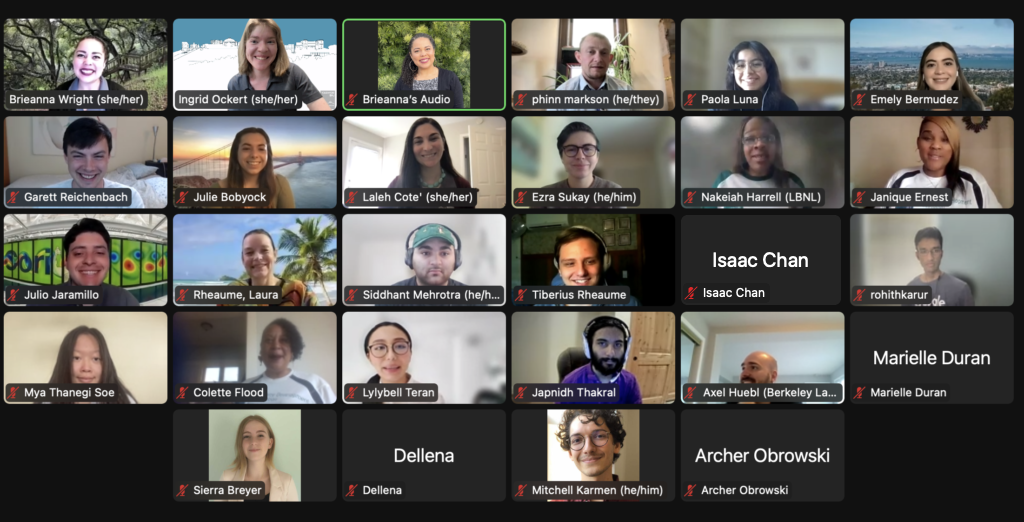
Interns and WD&E staff gathered virtually for the Spring 2022 Intern Poster Session.
On April 26, 2022, 16 interns from Workforce Development & Education (WD&E) programs gathered together over ZOOM. Over the course of 16 weeks, they collaborated with mentors from across Lawrence Berkeley National Laboratory (Berkeley Lab) on projects that ranged from creating computer algorithms to modeling atomic structures. They shared the results of their projects with each other and their mentors, family, and Berkeley Lab staff during the virtual poster session. Director Colette Flood thanked each intern for their hard work during the term. “Go out there and change the world with the knowledge that you have gained through this unique experience,” she told interns. Flood also thanked mentors for their dedication throughout their intern’s project, noting that this could never happen without their guidance and support. These WD&E internships gave interns a setting where they could learn new skills and dive deep into their research.
Two interns, Mya Thanegi Soe and Lylybell Teran, spent their internships learning about computer vision, a field of artificial intelligence that allows computers to learn information from images. Soe is a Community College Intern (CCI) and a student at Irvine Valley College; Teran is a Science Undergraduate Laboratory Intern (SULI) and a student at Adelphi University. Working alongside Dr. Daniela Ushizima and Dr. David Perlmutter, their goal was to create new software that could quickly sort thousands of plant root images. Plant root analysis allows scientists to learn more about long-term crop production, potentially reducing fertilizer input, and conserving soil carbon pools. This spring was the first time that either intern had ever worked on a computer vision project.
But while the project was challenging, Soe and Teran worked together to become experts. While they were on separate coasts – Soe was in California, Teran was in New York- they bonded together over daily ZOOM meetings. They reviewed libraries of computer code, like Python, and familiarized themselves with new concepts. Then they worked with supervised and unsupervised machine learning algorithms and neural networks. One of their favorite parts of this project, Soe and Teran noted, was working together and they added that they’d love to collaborate on another project.
Dr. Daniela Ushizima, one of their mentors, was present and she praised their initiative and their dedication. “[Soe and Teran] laid the groundwork for other projects within our team related to root analysis and phenotyping,” Ushizima explained. “It is wonderful that they are leaving working examples that others [at Berkeley Lab] can build upon. Some of the ideas and algorithms discussed during this Spring are likely to be part of a set of software aimed at automating a robot that does all the surveillance of model plants to improve new biofuel crops.” Soe and Teran thanked Ushizima and Perlmutter for their support and Teran added, “It was inspiring to be mentored by a fellow Latina woman in Computer Science like myself!” Soe commented that this internship opened her eyes to new career opportunities in AI.
Other interns also used their terms to expand their skills and orient themselves towards a career in the sciences. Paola Luna had just graduated with a bachelor’s degree in physics from San Diego State University. She was unsure of her path forward and decided to use a SULI internship as a way to learn more about optics. During Luna’s internship with Dr. Antoine Wojdyla at Berkeley Lab’s Advanced Light Source (ALS), she studied the ways that new types of silicon mirrors can be placed within the ALS to sharpen x-ray light. Luna’s work on the beamline greatly inspired her. “In this term, I learned so much,” Luna commented. “I realized that research is something that I want to pursue. It has helped me decide to be more confident in pursuing a Ph.D. program.”
Internships like CCI and SULI provide interns with valuable opportunities to try out potential careers. WD&E’s internship programs support the Department of Energy’s Office of Workforce Development for Teachers and Scientists (WDTS) goals of ensuring that DOE has a sustained pipeline of highly skilled and diverse science, technology, engineering, and mathematics (STEM) workers.
CCI and SULI are Department of Energy-funded national programs and are hosted by all the national laboratories.
–Ingrid Ockert, Marketing Communications Coordinator

